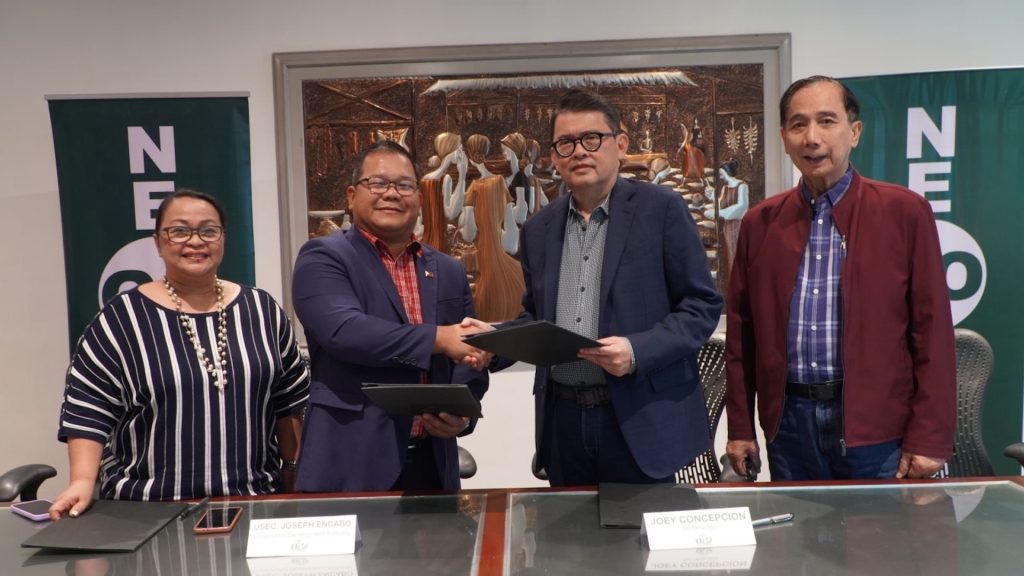
Looking to a Great 2024 for the Philippines
January 1, 2024
A Fulfilling 2023, A Promising 2024
January 8, 2024
Concepcion Inks MOU with CDA to Boost Agripreneurship in Cooperatives
A partnership that will link agriculture cooperatives with the country’s leading agri companies will soon give small farmers a better chance at scaling up. The Memorandum of Understanding, signed between Go Negosyo and the Cooperative Development Authority (CDA), aims to identify and organize cooperatives, which will then be assisted by big-brother companies in consolidating their produce, meeting market requirements, as well as accessing credit, inputs and training.
The MOU was signed last January 4, 2024, creating a strategic partnership that would support and implement the objectives of the Kapatid Angat Lahat Agri Program (KALAP) for the benefit of the cooperatives sector in the Philippines. Signing for Go Negosyo was its founder, Joey Concepcion, and for the CDA was its chair, Usec. Joseph Encabo.
The MOU aims to improve collaboration between cooperatives and the private sector, and promotes a value-chain approach through public-private partnerships.
“The bottom line is poverty alleviation, and many of the poorare in the agriculture sector. Unless we fix that, we will never solve the problem of poverty,” said Concepcion. Go Negosyoorganized KALAP to establish strategic partnerships between the government and the private sector. Under the program, small farmers are integrated into the value chain of big-brother companies, giving them access to mentoring, markets and capital.
“There are several different inclusive business models that our big brothers in KALAP have already implemented; the cooperatives can adapt the models suited to their crop and forge a relationship with the big-brother corporations, such as helping them get access to technologies and markets,” said Concepcion. “The partnership with the CDA will help us identify the cooperatives who are willing to be part of KALAP,” he said.
Go Negosyo is a non-profit organization that advocates for MSMEs in the Philippines, while the CDA is the lead government agency for all types of cooperatives. KALAP, meanwhile, was formalized in 2023 through several MOUs with government agencies. Its ranks have now grown to 50 big-brother companies. The principles of KALAP also became the basis for several MOUs with the ASEAN Business Advisory Council of the ten member-states of the ASEAN.
For his part, CDA Chairman Encabo called the MOU “timely”.President Ferdinand Marcos Jr. has been spearheading efforts to strengthen Philippine cooperatives and has called on the country’s cooperative movement to start the consolidation process for local farmers’ cooperatives associations.
“As we implement the merger consolidation focusing on agriculture cooperatives, the program can directly infuse to them and roll out as they make [cooperatives’] resources bigger, expand their membership, and add to their assets,” said Encabo.
Much hope has been placed on the revitalization of the Philippines’s agriculture sector. Raising productivity here is seen to generate additional jobs and stimulate economic activity, especially in the provinces. The World Bank estimates that around 43 percent of the country’s land area is agricultural; the sector accounts for around 24 percent of local employment.
With the Philippines still considered a lower-middle-income economy, increasing the productivity of agriculture, along withthe manufacturing sector, is seen as key to raising the country to middle-income status, a goal that is outlined in the 2023-2028 Philippine Development Plan, the country’s road map for socioeconomic progress in the medium term.

2/F RFM Corporate Center, Pioneer cor. Sheridan Sts. Mandaluyong City, Metro Manila, Philippines

